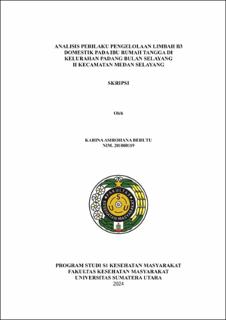| dc.contributor.advisor | Indirawati, Sri Malem | |
| dc.contributor.author | Berutu, Karina Asirohana | |
| dc.date.accessioned | 2025-04-25T07:45:09Z | |
| dc.date.available | 2025-04-25T07:45:09Z | |
| dc.date.issued | 2024 | |
| dc.identifier.uri | https://repositori.usu.ac.id/handle/123456789/103434 | |
| dc.description.abstract | Household hazardous waste generation is one of the environmental problems in Indonesia. Domestic hazardous waste that is not managed properly has an impact on health and the environment. Hazardous waste management including reduction and segregation is an important effort in reducing the amount of hazardous waste generation and reducing the impact of hazardous waste on health and the
environment. This study aims to analyze the characteristics of respondents, types and characteristics of domestic hazardous waste and domestic hazardous waste management behavior. The type of research is descriptive survey. The research was conducted in Padang Bulan Selayang II Village with a population of 3300 housewives. A sample of 98 housewives was taken using simple random sampling technique. Data collection with a questionnaire instrument that contains respondent characteristics, types and characteristics of hazardous waste, knowledge attitudes and actions about domestic hazardous waste management. The results showed that the type of expired, spilled, used B3 packaging waste was 74.7%, followed by the type of unspecified source as much as 25.3%, B3 waste based on characteristics was found to be 51.1% toxic. Housewives have good knowledge about hazardous waste as much as 89.8%, a positive attitude towards hazardous waste management as much as 92.9%, but all housewives have not carried out domestic hazardous waste management properly. The conclusion of the study is that all housewives have not carried out hazardous waste management properly. Research advice for housewives to reduce and sort at the household level. This will help reduce the amount of domestic hazardous waste generation
and prevent pollution in the environment. For the government and related agencies, it is recommended to conduct socialization of domestic hazardous waste
management and conduct studies on household hazardous waste management
plans. | en_US |
| dc.language.iso | id | en_US |
| dc.publisher | Universitas Sumatera Utara | en_US |
| dc.subject | Domestic B3 waste | en_US |
| dc.subject | housewife behavior | en_US |
| dc.title | Analisis Perilaku Pengelolaan Limbah B3 Domestik pada Ibu Rumah Tangga di Kelurahan Padang Bulan Selayang II Kecamatan Medan Selayang | en_US |
| dc.title.alternative | Analysis of Domestic B3 Waste Management Behavior in Housewives in Padang Bulan Selayang II Village Medan Selayang Subdistrict | en_US |
| dc.type | Thesis | en_US |
| dc.identifier.nim | NIM201000119 | |
| dc.identifier.nidn | NIDN0007087108 | |
| dc.identifier.kodeprodi | KODEPRODI13201#Kesehatan Masyarakat | |
| dc.description.pages | 116 Pages | en_US |
| dc.description.type | Skripsi Sarjana | en_US |
| dc.subject.sdgs | SDGs 3. Good Health And Well Being | en_US |


